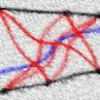 1
1I will hide my solution in case someone else tries this one too -
We know that , any number N is the sum of the digits in it , plus a multiple of 9 .
So , we can write , N = d ( N ) + 9 K
Similarly , d ( N ) = d ( d ( N ) ) + 9 L ,
for some integers " K " , and " L " .
Finally , our equation takes the form -
3 d ( d ( N ) ) + 18 L + 9 K = 2000 .
The right side is not divisible by " 3 " , but the left side is ! Contradiction !
Hence , there exists no such " N " .
 1
1Forgot to add - Great question !
 21
21may be a slightly greater qsn is find all n , satisfying n+ d(n) + d(d(n))= 2001
 62
62Shubodip... i was thinking of putting a multiple of 3 but then i resisted cos there are enough people who would cry it being an olympiad question... so i thought better keep it this way... (Atleast such people would learn that the function gives the same remainder as the original nmber on division by 9.
By the way this one was from NewYork city problem book....
 21
21actually ricky (bhaiya) killed the q in minutes, so i wanted that there is something again to think abt. :P
 62
62see the modified question..
I have changed it according to shubhodip's suggestion and also put in another modification on my own... would love to see solutions to both :)
 1
1For the modified question - 1972
 21
21when 'N' is not "n' its very much posible.. i wil explain it like if i can make digital sum = 10 at any step everything is possible.. and we can even take n = 10 at the first step or we can even take n = 1
 62
62exactly shubhodip... so what are all the solutions.... ?
 21
21for this i have to use pen n u have to mention wat is meant by 'N' times
is n + d(n) + ... total number of terms = 'N'
or n + [d(n) + d(d(n)) ....] terms inside bracket = 'N' ?
 62
62if d(d(n)) refers to d2(n),
then the LHS is
n+d(n)+d(d(n))+....+dN-1(n)=2000
 21
21actually for the previous problem when N is not equal to 'n'
we just need d(d(n))| 2000 - n - d(n)
all the solutions can be obtained by doing case work with d(d(n)), note that it is one digit number(except when it is equal to 10)
but i m nt able to express them in closed form ,like all the soltuions are of the form
t(t+1) [(et3+ t! + 7t)log(pi/t)], where [.] is gif and t is a highly composite number. :D
 21
21and for the qstn
find n satisfying n+ d(n) + ...dn-1(n) = 2000 there are no such 'n'. but if we change 2000 to some other number then there it is possible to make it possible.
for the modified qstn soln are 1969 ,1972,1975
Lemma that may help ;)
''at least any one of two positive integer can be represented in the form f(n). where f(n) = n+ d(n) ''